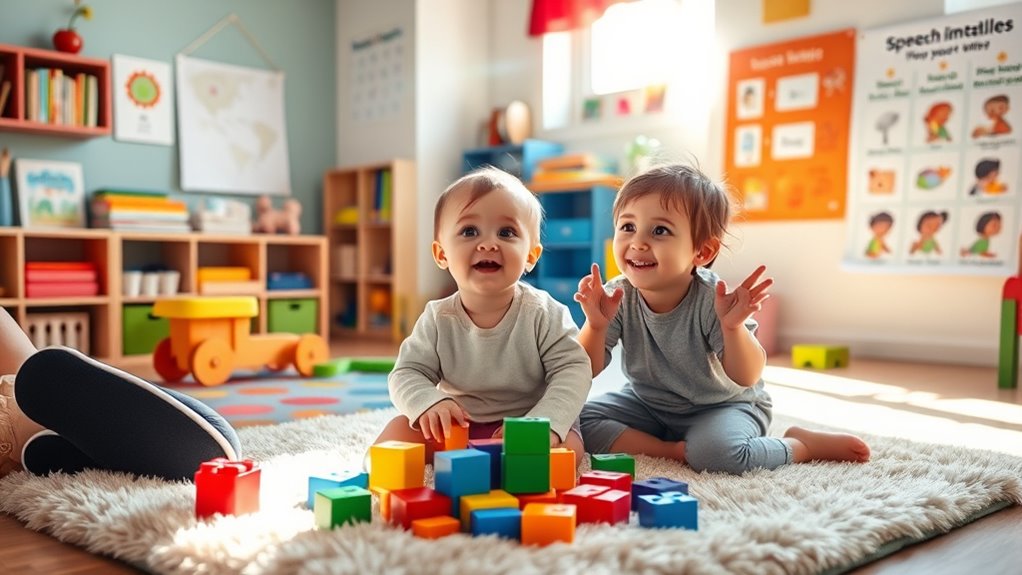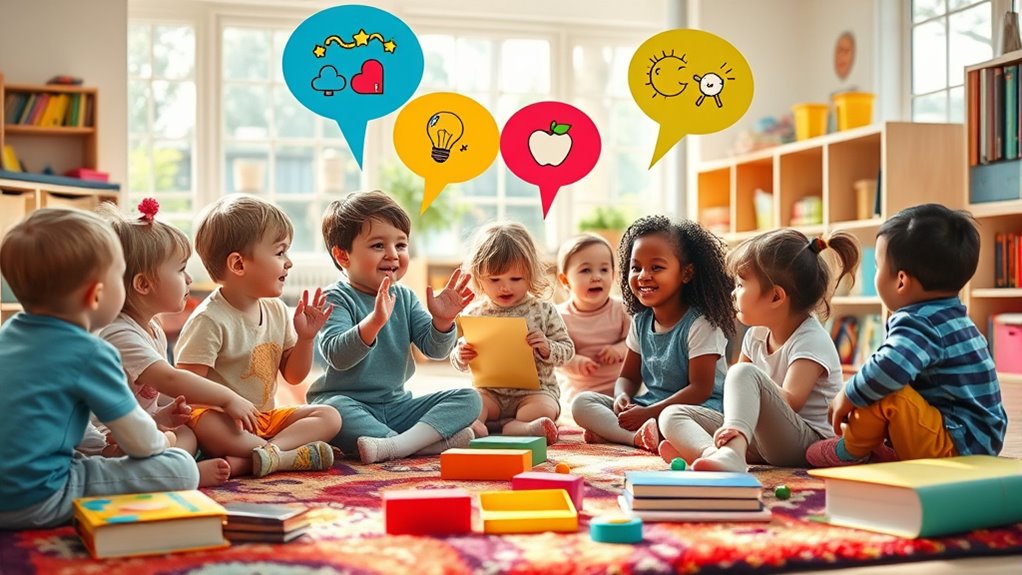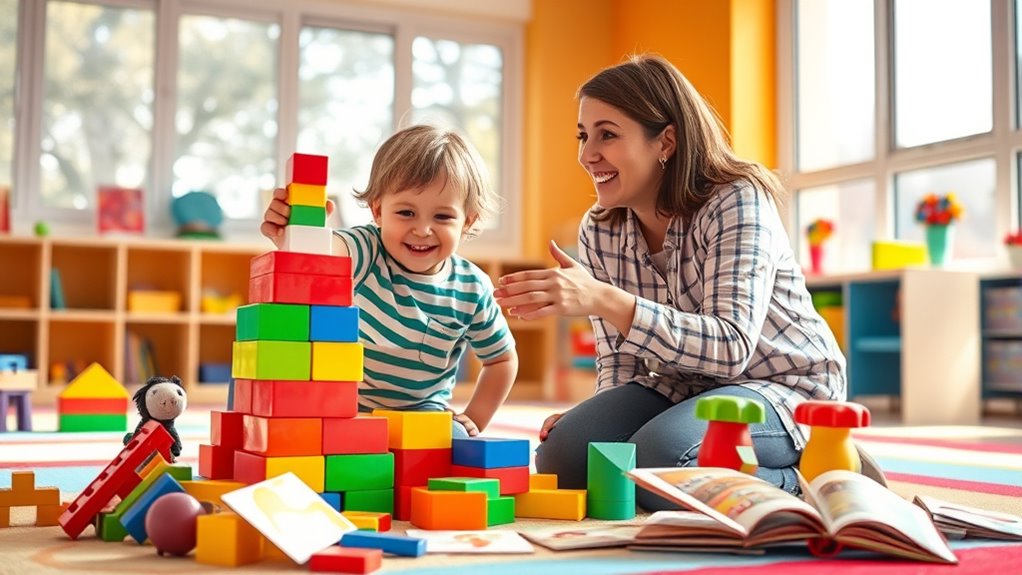To encourage speech and language development, engage your child in rich language experiences. Talk to them during daily routines, narrating what you do to introduce new vocabulary. Read aloud and make playful language games a part of your interactions. Respond to their attempts to communicate, fostering back-and-forth conversations. Strong language skills support academic success and social interactions. Keep exploring ways to boost their skills for lasting benefits in their communication journey.
Key Takeaways
- Narrate daily activities to introduce new vocabulary and concepts, enhancing language exposure during routine tasks.
- Engage in back-and-forth conversations to stimulate verbal skills and promote interactive communication.
- Read aloud regularly to connect spoken and written language, fostering comprehension and vocabulary growth.
- Use music, singing, and playful language games to make learning enjoyable and engaging for children.
- Label objects and actions in the environment to reinforce understanding and vocabulary acquisition.

LearnWorx 101 Baby Flash Cards for Toddlers 1-3 | Award Winning First Words Toddler Flash Cards | Speech Toys Help Learn Objects, Numbers & Play Games – Big Toddler Learning Flashcards Preschool Kids
101 Flashcards For Toddlers 1-3 – Children love to learn with Learnworx. 101 first words kids flash cards….
As an affiliate, we earn on qualifying purchases.
As an affiliate, we earn on qualifying purchases.
The Importance of Early Language Exposure

When you expose your child to rich language early on, you’re laying the groundwork for their future linguistic skills and cognitive development. A stimulating language environment greatly boosts their academic outcomes and verbal abilities.
Engaging in conversations with your child, encouraging back-and-forth interactions, enhances their verbal skills. Providing high-quality language input—like longer sentences and varied vocabulary—improves their language-processing abilities.
Remember, socioeconomic status can impact the quality and quantity of the language they experience, so aim to create a rich environment at home. Prioritize reading, storytelling, and engaging activities that invite communication.

Spanish Flash Cards for Kids | Bilingual Talking Flashcards with Audio | English Learning Cards | Interactive Language Development Toy | Educational Flash Cards for Early Learning
NTERACTIVE LEARNING TOYS FOR EARLY EDUCATION – These Spanish-English flash cards for kids provide an engaging way to…
As an affiliate, we earn on qualifying purchases.
As an affiliate, we earn on qualifying purchases.
Understanding Speech Milestones and Delays

Understanding speech milestones and delays is essential for supporting your child’s communication development.
From birth to three months, your infant will coo, smile, and respond to familiar voices. By four to six months, they’ll start recognizing sounds and turning towards them.
As they reach six to twelve months, expect babbling with sounds like “da-da” and “ma-ma.” At around one year, your child typically speaks their first words and begins to expand their vocabulary.
Keep in mind that some children may be “late talkers,” and this is normal. However, if you notice significant delays, it’s important to seek professional evaluation and support.
Early intervention can make a big difference in overcoming challenges and enhancing your child’s speech and language skills.

First Little Readers Parent Pack: Guided Reading Level A: 25 Irresistible Books That Are Just the Right Level for Beginning Readers
As an affiliate, we earn on qualifying purchases.
As an affiliate, we earn on qualifying purchases.
The Impact of Language Skills on Social and Academic Success

Language skills play an essential role in shaping your child’s social and academic success, as they directly influence how effectively your child communicates and interacts with others.
Strong language abilities predict academic performance in subjects like reading and math, enabling your child to grasp complex concepts and engage actively in class.
On the social side, effective communication fosters peer relationships, builds confidence, and helps avoid isolation. Children with solid language skills often excel in teamwork and conflict resolution, enhancing their social interactions.
Early intervention can greatly improve language deficits, paving the way for better long-term educational outcomes.

Peacurh Trilingual Learning Toy Tablet with Music & Sound, Montessori Speech Musical Therapy Toys, Gifts for Boy, Girl, Baby, Toddler, for Age 1, 2, 3 Year Old (12-18 Months)
【Multi-functional Learning Tablet Toy】The toddler tablet covers multiple themes, including Alphabet, Shapes, Colors, Numbers, Animals, Vehicles, Instrument, Fruits…
As an affiliate, we earn on qualifying purchases.
As an affiliate, we earn on qualifying purchases.
Effective Strategies for Encouraging Language Development

To foster your child’s language development effectively, it’s important to integrate language-rich activities into everyday life. Narrate daily routines like bathing or feeding to expose them to new vocabulary. Use consistent steps during tasks to help them grasp sequences. Label objects and actions to reinforce their understanding. Create interactive routines with play to keep them engaged.
Engage in reading aloud, pointing to words to connect spoken and written language. Personalize books to link narratives to their experiences. Model clear communication, encourage turn-taking in conversations, and expand on their sentences to enhance their language skills.
Incorporate music, singing, and playful language games to make learning fun. Following your child’s interests will further enhance their engagement and learning potential.
The Role of Neurological Factors in Language Processing

Incorporating effective strategies for encouraging language development lays the groundwork for exploring the intricate neurological factors that underlie language processing.
Your brain utilizes various structures, like Broca’s area, to manage syntax and language production. The dorsal and ventral streams facilitate sound-to-motor mapping and semantic processing, respectively.
Essential regions like the middle temporal gyrus and inferior frontal gyrus support comprehension and articulation. Pathways such as the dorsal pathway connect auditory input to motor actions, enhancing your ability to speak.
Understanding these neurological factors helps you appreciate the complexity of language acquisition and processing, highlighting the importance of fostering a supportive environment for effective communication development.
Recognizing the role of these mechanisms can guide your approach to encouraging language skills.
The Need for Early Intervention and Support Systems

While it might seem easy for some children to pick up language skills, many struggle without the right support. Early intervention is essential as it enhances communication skills and helps kids express themselves more clearly.
Identifying speech and language difficulties early allows for better understanding and use of language in various contexts. This intervention not only boosts cognitive development but also fosters meaningful social interactions, reducing feelings of isolation.
Early identification of speech and language challenges enhances cognitive growth and promotes social connections, alleviating isolation.
Parents play an important role by engaging in daily language activities at home. Collaborating with professionals guarantees thorough support tailored to each child’s needs.
Ultimately, early intervention leads to better long-term outcomes, preventing academic struggles and supporting emotional well-being. Investing in early support makes a significant difference.
Frequently Asked Questions
What Are the Signs of a Speech Delay in Toddlers?
When observing your toddler, look for signs of speech delay. If they aren’t babbling by 9 months, or if their vocabulary is limited by 18 months, that could be concerning.
Notice if they struggle with gestures like pointing or waving. If they often seem frustrated while trying to communicate, or if they aren’t using two-word phrases by age two, it might indicate a speech delay needing attention.
How Can Parents Promote Bilingual Language Development?
Did you know that children exposed to multiple languages can outperform their monolingual peers in cognitive flexibility?
To promote bilingual language development, incorporate both languages into daily routines and label household items. Engage in play-based learning and read bilingual stories together.
Consistency is key, so make sure to use both languages regularly.
Finally, immerse your child in cultural activities and community programs to enhance their language skills and understanding.
Are There Specific Toys That Aid Language Development?
Certain toys can greatly aid language development. Traditional toys like wooden blocks or dolls encourage imaginative play, enhancing vocabulary through storytelling.
Open-ended toys, such as cars or farms, promote joint attention and imitation, essential for communication skills. Interactive books engage kids with sounds, helping phonetic learning.
Even outdoor toys can foster social interactions, making playtime both fun and educational. Choose toys that spark interaction to boost your child’s language skills effectively!
What Role Does Play Have in Language Learning?
Imagine a child immersed in a world of colorful blocks and stuffed animals, creating vibrant stories.
Play fuels language learning by mimicking real conversations through role-play and imaginative scenarios. As you engage in these playful activities, you’ll notice vocabulary blossoming and sentences growing more complex.
How Do Cultural Differences Affect Language Acquisition?
Cultural differences greatly affect language acquisition. When you immerse yourself in a new culture, you encounter unique vocabulary, expressions, and communication styles. This exposure shapes your understanding and ability to convey ideas effectively.
Conclusion
In the grand tapestry of your child’s life, weaving strong threads of communication is essential. By nurturing their speech and language development, you’re not just planting seeds; you’re cultivating a flourishing garden where ideas blossom and friendships grow. Remember, every word they speak is a step towards their future success. So, be their guiding light, illuminating the path to rich conversations and connections, ensuring they flourish in both social and academic domains. Don’t wait—start today!









